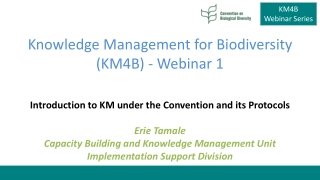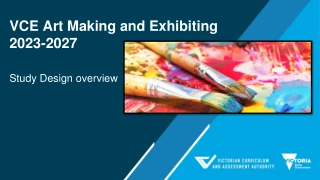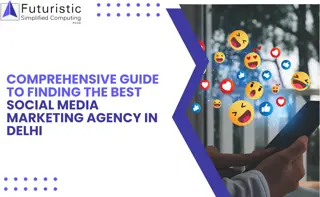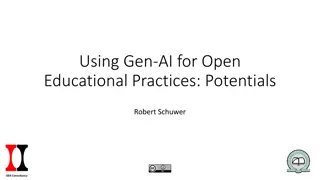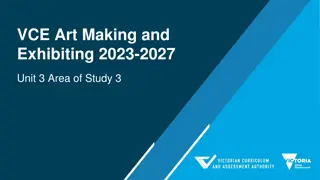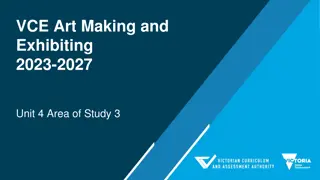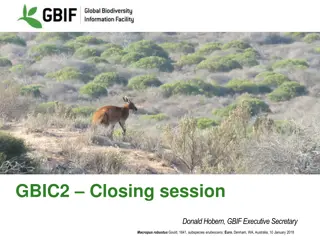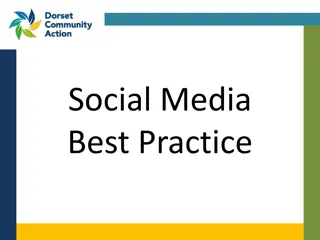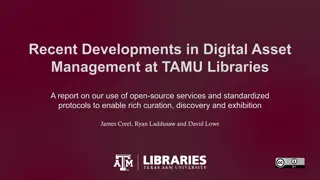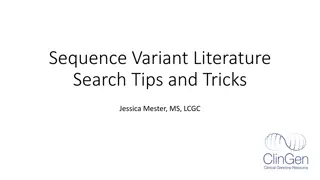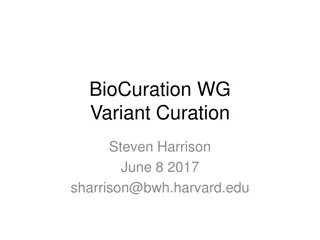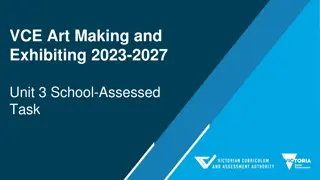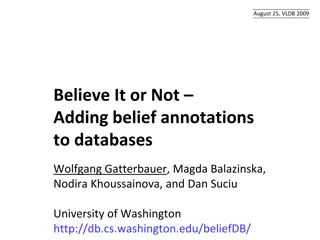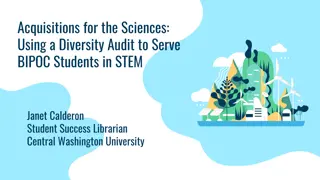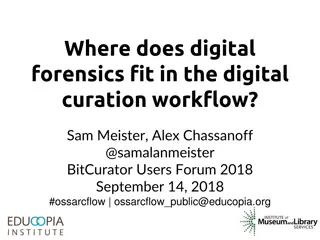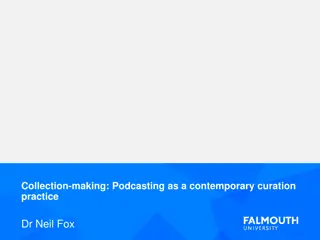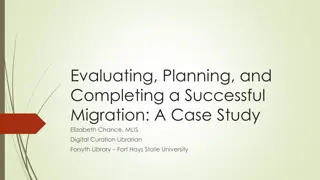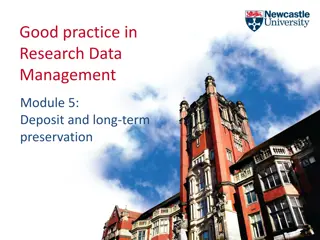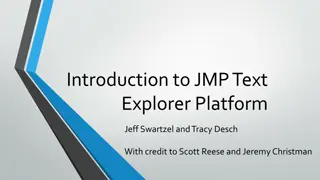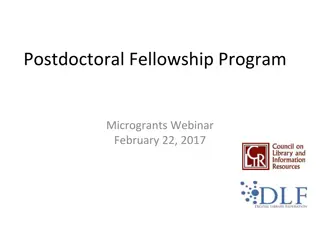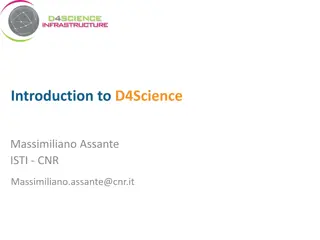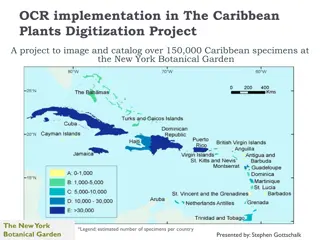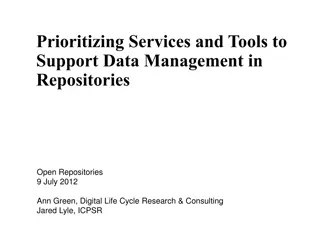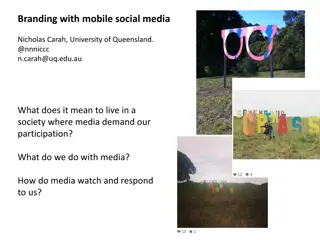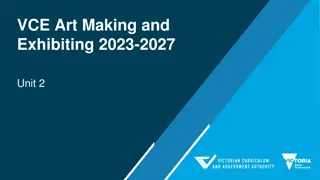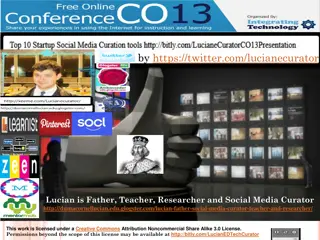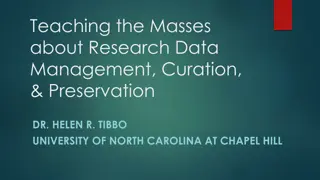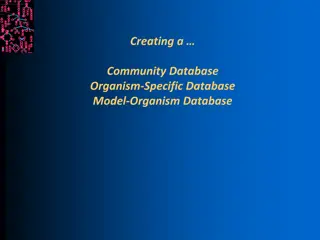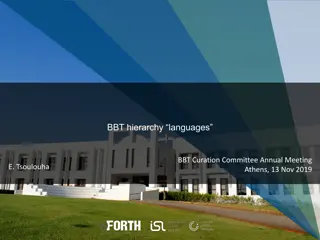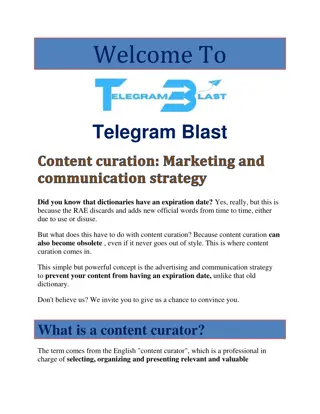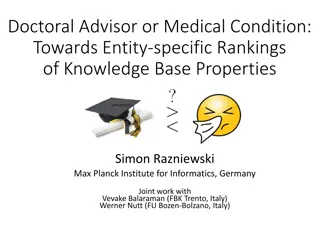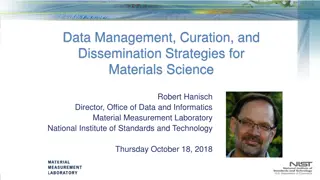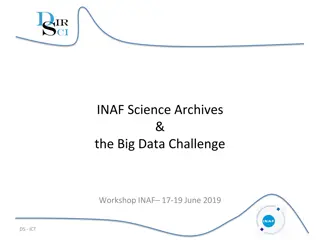Knowledge Management for Biodiversity
Join the KM4B Webinar Series to learn about knowledge management in the context of biodiversity, its protocols, and the importance of accessible data and information for effective biodiversity governance. Explore key initiatives and tools supporting the collection, curation, and sharing of biodivers
2 views • 25 slides
VCE Art Making and Exhibiting 2023-2027
This study design aims to explore the characteristics and properties of materials, techniques, and processes in art-making. It delves into the historical development of art forms across different periods and cultures, emphasizing aesthetic qualities and the use of visual language to convey ideas. St
3 views • 25 slides
Unlock Success with the Best Social Media Marketing Agency in Delhi
Discover the key to successful social media marketing with our comprehensive guide on finding the best Social Media Marketing Agency in Delhi. Learn about essential services offered by top agencies, including social media strategy development, content creation and curation, social media management,
1 views • 7 slides
Leveraging Gen-AI for Enhanced Open Educational Practices
Exploring the potentials of Generative Artificial Intelligence (Gen-AI) in Open Educational Practices (OEP) including automatic content generation, resource curation, findability enhancement, and adaptive learning facilitation. Embracing AI technologies to revolutionize the OER landscape and foster
1 views • 12 slides
VCE Art Making and Exhibiting Unit 3: Exhibition Planning and Design Overview
Dive into the world of art exhibitions with VCE Art Making and Exhibiting Unit 3. Explore the process of planning, designing, and curating exhibitions, including exhibition layout, curation, conservation, and viewer interaction. Students focus on selecting artworks from different artists to create t
0 views • 18 slides
VCE Art Making and Exhibiting: Conservation and Care of Artworks
Explore the importance of conservation and care in presenting artworks, focusing on exhibition spaces, art forms, and the role of research in preserving art. Delve into exhibition design, curation, and conservation practices to understand how to maintain and showcase artworks effectively.
0 views • 20 slides
Shared Challenges in Biodiversity Informatics Collaboration
The Coalition of Open Biodiversity Infrastructures and Networks aims to enhance collaboration for comprehensive biodiversity data management and accessibility. They focus on delivering biodiversity knowledge effectively, enabling stakeholder participation, promoting open data sharing, mobilizing his
2 views • 13 slides
Effective Social Media Best Practices for Organizations
Understanding the importance of social media in today's digital landscape, this guide emphasizes key practices for organizations to maximize their online presence. Covering topics such as brand reflection, scheduling posts efficiently, content curation, hashtag usage, maintaining professionalism, an
0 views • 9 slides
Recent Developments in Digital Asset Management at TAMU Libraries
A comprehensive report on the use of open-source services and standardized protocols for rich curation, discovery, and exhibition at TAMU Libraries. The report covers topics such as architectural overview, structured content in Fedora and DSpace, IIIF manifests, IIIF Collection API 2.0, minting iden
0 views • 11 slides
Enhancing Literature Search for Sequence Variant Analysis
Enhance your literature search skills for sequence variant analysis with tips on effective use of variant nomenclature, sources for finding articles for ACMG criteria application, and tools like HGMD, ClinVar, MasterMind, Google, and Google Scholar. Discover the importance of functional studies, cas
0 views • 21 slides
BioCuration Variant Curation Guidelines and Recommendations
BioCuration Working Group's variant curation guidelines by Steven Harrison provide critical flexibility in variant classification, allowing criteria weights to be adjusted based on professional judgment. Recommendations include harmonizing ACMG/AMP guidelines and documenting strength-modified eviden
3 views • 42 slides
VCE Art Making and Exhibiting 2023-2027: Study Specifications Overview
Delve into the world of VCE Art Making and Exhibiting with a comprehensive study specifications overview. Explore various aspects including creating artworks, exhibiting them, planning exhibitions, curation, conservation, and more. Understand the processes involved in making and presenting art, and
0 views • 33 slides
Managing Belief Annotations in Databases: A Modal Logic Approach
Explore the concept of belief databases that enable data curation based on modal and default logic in a relational model. The work discusses managing inconsistent views in community databases and presents a motivating application scenario to illustrate the challenges and solutions in handling belief
0 views • 34 slides
Enhancing BIPOC Representation in STEM Collections Through Diversity Audit
Central Washington University's Student Success Librarian, Janet Calderon, explores the importance of evaluating and enhancing diversity in library collections to better serve BIPOC students in STEM fields. The study examines the lack of established criteria for collection diversity, the significanc
0 views • 14 slides
Exploring the Integration of Digital Forensics in Digital Curation Workflows
This content delves into the role of digital forensics within the digital curation workflow, examining how institutions can combine tools to meet local needs and implement handoffs between different systems. It also discusses the socio-technical factors and institutional drivers influencing decision
0 views • 27 slides
Podcasting as a Contemporary Curation Practice: Insights and Perspectives
Exploring the evolving landscape of curation in the digital age, this collection delves into the transformative role of podcasting as a medium for contemporary curation. Dr. Neil Fox highlights the shifting dynamics of curation, drawing on insights from Terry Smith, Stewart Brand, and Hans Ulrich Ob
0 views • 30 slides
Evaluating, Planning, and Completing a Migration: A Case Study by Elizabeth Chance
Elizabeth Chance, an MLIS Digital Curation Librarian at Fort Hays State University, discusses the background, rationale, and outcomes of successfully migrating digital collections. She shares insights gained from the migration process, focusing on challenges, solutions, and lessons learned.
0 views • 20 slides
Best Practices for Research Data Management: Deposit and Long-Term Preservation
Explore essential topics in long-term data management, including considerations for data centers and repositories, metadata usage, and digital curation. Understand the distinctions between digital archiving, preservation, and curation, along with key questions regarding data deposits and embargoes.
1 views • 28 slides
Introduction to JMP Text Explorer Platform: Unveiling Text Exploration Tools
Discover the power of JMP tools for text exploration with examples of data curation steps, quantifying text comments, and modeling ratings data. Learn about data requirements, overall processing steps, key definitions, and the bag of words approach in text analysis using Amazon gourmet food review d
0 views • 23 slides
CLIR/DLF Microgrants for Postdoctoral Fellows
Support collaborative projects for 2016-2018 CLIR/DLF Postdoctoral Fellows addressing cross-institutional issues. Eligible fellows must focus on Medieval Studies or data curation, forming teams to develop online resources or workshops benefiting broader needs beyond the fellowship community.
0 views • 32 slides
Exploring the Innovative D4Science Infrastructure
Dive into the cutting-edge D4Science infrastructure, a powerful platform seamlessly integrating over 500 software components to connect thousands of scientists worldwide. Discover how it offers vast data resources, access to quality records, and a plethora of Virtual Research Environments tailored t
0 views • 12 slides
Digitization Project for Caribbean Plants at New York Botanical Garden
The Caribbean Plants Digitization Project at New York Botanical Garden aims to image and catalog over 150,000 specimens from the Caribbean region. Through OCR and data parsing, the project focuses on curation, barcoding, cataloging, and imaging of specimens. Expeditions since 1895 have contributed t
0 views • 15 slides
Prioritizing Services and Tools for Data Management in Repositories
Partnerships between domain-specific archives and institution-based repositories are vital for providing expertise and best practices to research communities. Data preservation, dissemination, and long-term stewardship are core functions of repositories, supported by data processing, curation servic
0 views • 31 slides
Exploring Media Participation and Branding in Society
Delve into the interplay between cultural life, mobile media, and branding in a society where media demand our participation. Discover how media impact us, watch and respond to us, and the evolving dynamics of individual curation in the digital realm. Learn about experiments with social media by big
0 views • 22 slides
VCE Art Making and Exhibiting Study Specifications
Explore, expand, investigate, understand, develop, and resolve art forms, techniques, ideas, processes, and aesthetic qualities in VCE Art Making and Exhibiting. Study specifications cover creating and exhibiting artworks, planning exhibitions, curation, and conservation in various art spaces.
0 views • 35 slides
Empowering Education with Innovative Tools and Platforms
Explore the transformative role of modern tools like Glogster Edu and SymbalooEDU in education. Lucian, a Father, Teacher, Researcher, and Social Media Curator, emphasizes the importance of curation in the digital age. Discover how these platforms enable students and educators to express creativity,
0 views • 13 slides
Data Management, Curation, and Preservation Education Initiatives
Dr. Helen R. Tibbo from the University of North Carolina at Chapel Hill leads efforts in teaching research data management, curation, and preservation. The CRADLE project and MOOCs address the need for educating data scientists, librarians, archivists, and students on handling research data effectiv
0 views • 20 slides
Creating a Model Organism Database: The Importance and Process
In the realm of bioinformatics, the creation of Model Organism Databases (MODs) plays a crucial role in advancing genomic research and understanding the complexities of various organisms. MODs facilitate pathway analyses, omics data analysis, and the development of metabolic models, serving as valua
0 views • 17 slides
Exploration of Language Hierarchies in BBT Curation Committee Annual Meeting
Delve into the categorization of languages within the BBT hierarchy, discussing the distinctions between natural and formal languages, potential restructurings of language classification, and considerations for expressing communicative power through different language forms.
0 views • 12 slides
Content curation Marketing and communication strategy
Content curation select, organize and present relevant information for your audience. Optimize your advertising strategy!
0 views • 12 slides
Entity-specific Rankings of Knowledge Base Properties
Towards entity-specific rankings of knowledge base properties, this research explores the problem of property ranking for entities based on their attributes and properties. Various applications in knowledge base curation and natural language generation are discussed, along with related work in entit
0 views • 26 slides
Data Management, Curation, and Dissemination Strategies for Materials Science
Robert Hanisch, Director at the National Institute of Standards and Technology, discusses data management, curation, and dissemination strategies for materials science. The presentation covers topics such as bio sketches, the Office of Data and Informatics, standard reference data, and making the mo
0 views • 51 slides
INAF Science Archives & the Big Data Challenge Workshop Summary
This workshop held in INAF, Italy, focused on the interaction between Computing Science and Astrophysics. Key points included data curation, openness, use cases, status of current and future archives, and expertise networking. The discussion highlighted terms like Open Science, FAIR principles, Inte
0 views • 7 slides
